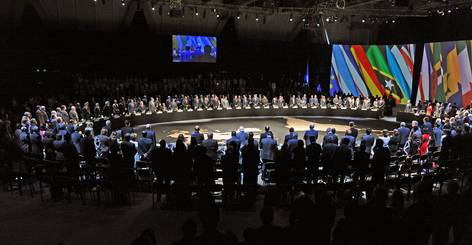NEWS
We should honour the memory of the Holocaust so that it never happens again
During the second day discussion of the Summit of the European Union and the Community of Latin America and Caribbean States (EU-CELAC), the Prime Minister of the Republic of Slovenia, Janez Janša, reminded the participating Heads of State and "The EU-CELAC partnership is an extremely important forum for discussion and dealing with the causes of potential mass violence in different parts of the world. Together we represent 60 countries with over one billion population and almost one-third of UN members. We enjoy a high level of legitimacy and bear huge responsibility," stressed Prime Minister Janša, who presented this initiative for the first time at the UN General Assembly meeting in New York in September last year. Since then, the idea has gained ground and has received growing support both from the international political community and international non-governmental organisations.
The financial crisis has strengthened various instability factors. Social inequality, growing unemployment, limited access to drinking water, natural resources, education and health services in conjunction with ethnic, religious and political tensions are a source of instability in many areas across the world. "The existing world order, which was created in the aftermath of World War II, cannot fully and adequately respond to these risks, especially when human security is concerned," noted Prime Minister Janez Janša.
In this context, efforts should be made to establish a more effective system of prevention. "History has taught us that failure to respond to such imbalances in a timely and appropriate manner could result in violence or even mass atrocities such as genocide. Prime Minister Janša called attention to this relevant issue also because today we commemorate the International Holocaust Remembrance Day. We should never forget millions of innocent Jews and other minorities put to death in an inhuman and cruel way. The preservation of their memory should serve as a constant reminder and warning that it should never happen again.
Prime Minister Janša regretted that humanity is still witnessing tragedies such as those in Syria and Mali after so many decades of achievements in human and technological development. "Unfortunately, we are faced all over again with our inability to assume our shared responsibility for the protection of innocent people," said Prime Minister Janša and expressed his belief that regional efforts are the key to significant improvement in remedying this weakness of the international community. Regions should have primary responsibility to call attention to the circumstances leading to conflicts and mass atrocities. They have historical memory and understanding of ethnic relations and customs.
"In our belief, regions should act as a driving force for ensuring justice, development, peace and security. They should be given broader opportunities and the capacity to effectively counter genocide and other mass atrocities. They can provide a reliable early warning system and can also develop a lawful and active system of prevention," added Prime Minister Janša.
On the margins of the Summit, Prime Minister Janša continued with informal discussions with the participating Heads of State and Government of EU Member States and Latin American countries.
At the close of the Summit, the participants observed a minute's silence as an expression of sympathy with the Brazilian people following the tragic event in a Brazilian nightclub that claimed numerous lives.
Following below is today’s address by the Prime Minister of the Republic of Slovenia, Janez Janša, to participants in the EU-CELAC Summit in the English language.








